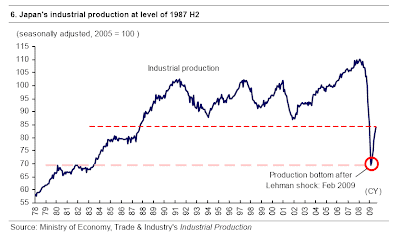Well, I made a cynical story out of Chinese pig farmers last month, and China is very likely blowing the bubble. It looks like Chinese farmers prefer copper over the rubbish consumer electronics?
However, Mike Shedlock went on to dig deep as possible into leading economic indicators, including the ECRI' s WLI.
Paul Krugman took over the awesome takedown to state:
I’d add that this is a really, really bad time to be relying on conventional indicators.However, ECRI was quite quick to defend itself and reply:
Perhaps the intensity of the attacks today have more to do with the fact that so many (including hedge funds and investment advisors like Michael Shedlock) have missed the nearly 60% market rally since the spring, which makes it so hard to accept that ECRI’s leading indexes were correct once again.Well, the difference is at what people look and where they are ready to put their money. That' s the questions of economic sustainability and value. This is quite well described by "The Daily Reckoning" under the "Roach and His Bearish, Pessimistic Attitude":
Well, one should ask, even if the cyclical recovery of couple quarters is inevitable, is it worth to pay the premium for cyclical rebound, if, assuming the outlook for macroeconomic balance, it is not sustainable in long term?I would also ask the optimists what has changed in the global economy over the past year to make them so...optimistic. How does a huge increase in government debt do anything but provide a short term boost, masking long term structural problems? How can more debt solve problems caused by too much debt? How do they expect ultra low interest rates - which encourage consumption and discourage saving - to correct the imbalances?
I'm guessing the answers would have something to do with faith in governments and policy makers to get us out of this mess. The fact that they didn't see the mess coming doesn't seem to register.
Roach's analysis is far more realistic. He writes that, "This [government attempts to 'fix' things] is the same dubious script the world followed in the aftermath of the bursting of the equity bubble in the early part of this decade. And look how that ended. With far more excess liquidity currently sloshing over into asset markets, there is great temptation to erase the memories of the Great Crisis. Therein lies a pitfall for the markets - as well as for a still unbalanced post-crisis world.
Richard Koo, the chief economist at Nomura, wrote in the note yesterday:
Click on chart to enlarge, courtesy of Nomura.It has been my practice in the past to focus more on the direction of economic activity than the absolute level. Given the dramatic changes in the level of activity during the current recession, however, I think we need to consider the possibility that past rules of thumb are no longer operative.
I concur wholeheartedly with Bank of England governor Mervyn King’s warning in August that we should focus on the level of economic activity and not the rate of growth. After all, there is no proof that improvements in familiar leading economic indicators will once again signal recovery.
People expected the worst after the Lehman shock, and sentiment improved sharply in response to massive government support measures. However, it will take a long time before the level of real economic activity rises enough to boost capex and employment. I therefore think it is dangerous to ignore the level of economic activity and focus exclusively on whether it is rising or falling.
 Momentum feeds on itself, and do not underestimate the positive feedback loop ...
Momentum feeds on itself, and do not underestimate the positive feedback loop ...
No comments:
Post a Comment